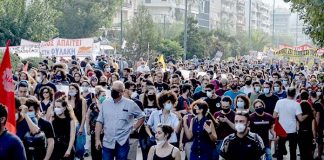The new Greek austerity package, demanded by “the troika”—the IMF, European Union (EU) and European Central Bank imposes further vicious cuts on the people of Greece. But the level of workers’ resistance is also rising—with some workplaces beginning to be brought under workers’ control.
The cuts will see the minimum wage slashed by 22 per cent, and a further 150,000 public sector jobs go. The Workers Housing Organisation will also be abolished, which builds public housing and subsidises rents for 85,000 families.
The cuts are imposed in return for a new bailout to satisfy the bankers and bond markets. The new loan will be transferred directly to the banks to service Greece’s debt. In addition the EU is demanding changes to Greece’s constitution that would force it to prioritise debt repayment above social spending.
The official aim is to reduce Greek debt to 120 per cent of the country’s GDP by 2020. Yet an official study by the Troika shows this will only happen if its economy returns to 3 per cent growth every year from next year. This is wildly unrealistic. The IMF calculates Greece’s economy shrank 6 per cent last year and will contract a further 3 per cent this year.
These calculations include the impact of writing off €105 billion of Greece’s total €350 billion debt, agreed with bond holders in March.
Most economists agree that Greece will eventually be forced to default on its debts.
But the un-elected Greek government, headed by Lucas Papademos, former deputy governor of the ECB installed by the Troika, doggedly drove it through parliament. Such is the level of popular resistance, this brought the government close to breaking. Turmoil within the unity government saw ministers from both PASOK (the Greek Labor Party) and the extreme right-wing LAOS resign. But then EU leaders demanded further cuts.
Workers’ control
Greek workers are continuing to resist. A record 20.9 per cent of workers and over 50 per cent of young people are now unemployed.
There have been two years of continual general strikes, creating a new layer of experienced activists deeply engaged in the strike movement. Now general strikes can be called at a day’s notice and implemented solidly.
Many employers are trying to cut wages, using the IMF’s claims that Greece is not competitive enough. But as Greek socialist Panos Garganas explains, “Many groups of workers are strong enough to say they won’t take wage cuts and are shutting their workplaces down.
“Meetings of whole workforces are taking place. They set up committees with the authority of mass workers’ meetings.”
Individual groups of workers are taking the action further. Steel workers near Athens have been occupying their workplace for four months, and hospital workers have held regular strikes against the cuts to health care.
The cutbacks are leading to a breakdown of basic services. In the school system, in addition to teachers losing their jobs, Georgia Koffa, a secondary school teacher unionist in Athens explains:
“Students have no books and no heating in the classrooms. And many students are hungry because they cannot afford food.”
“Seeing the workers’ occupations in other workplaces has inspired teachers. We are now in the process of deciding whether we can take our jobs into our own hands and run the school ourselves.”
This has already happened at the General Hospital in Kilkis, where staff have taken control of managing the hospital, issuing a statement declaring, “We occupy the public hospital and put it under our direct and absolute control. The General Hospital of Kilkis will henceforth be self-governed and the only legitimate means of administrative decision making will be the General Assembly of its workers.”
At the Eleftherotypia newspaper, the second largest in Greece, as Moissis Litsis, a worker there, explains, the 800 staff have begun using the offices to produce their own newspaper (see opposite page).
The government is expected to call general elections by May, and opinion polls show the combined vote of the far left at 40 per cent.
The Troika claims there is no alternative to cuts to government spending and wages. But if Greece defaulted on its debts and went off the Euro, the money spent on debt repayment could be put back into paying for hospitals, schools and creating public sector jobs.
But this would only help Greek workers if the government also took control of Greek banks, guaranteeing people would not lose their homes as Greece’s currency depreciated, and imposed controls to stop Greece’s wealthy taking their money abroad.
As Greek workers escalate their struggles, the hope of imposing their own control not just on individual workplaces but on the whole economy grows.
By Emma Torzillo and James Supple





